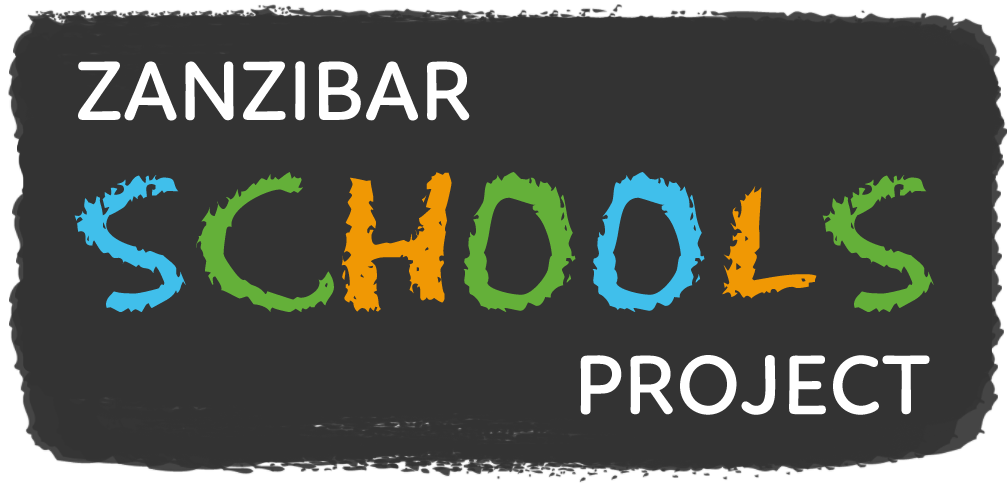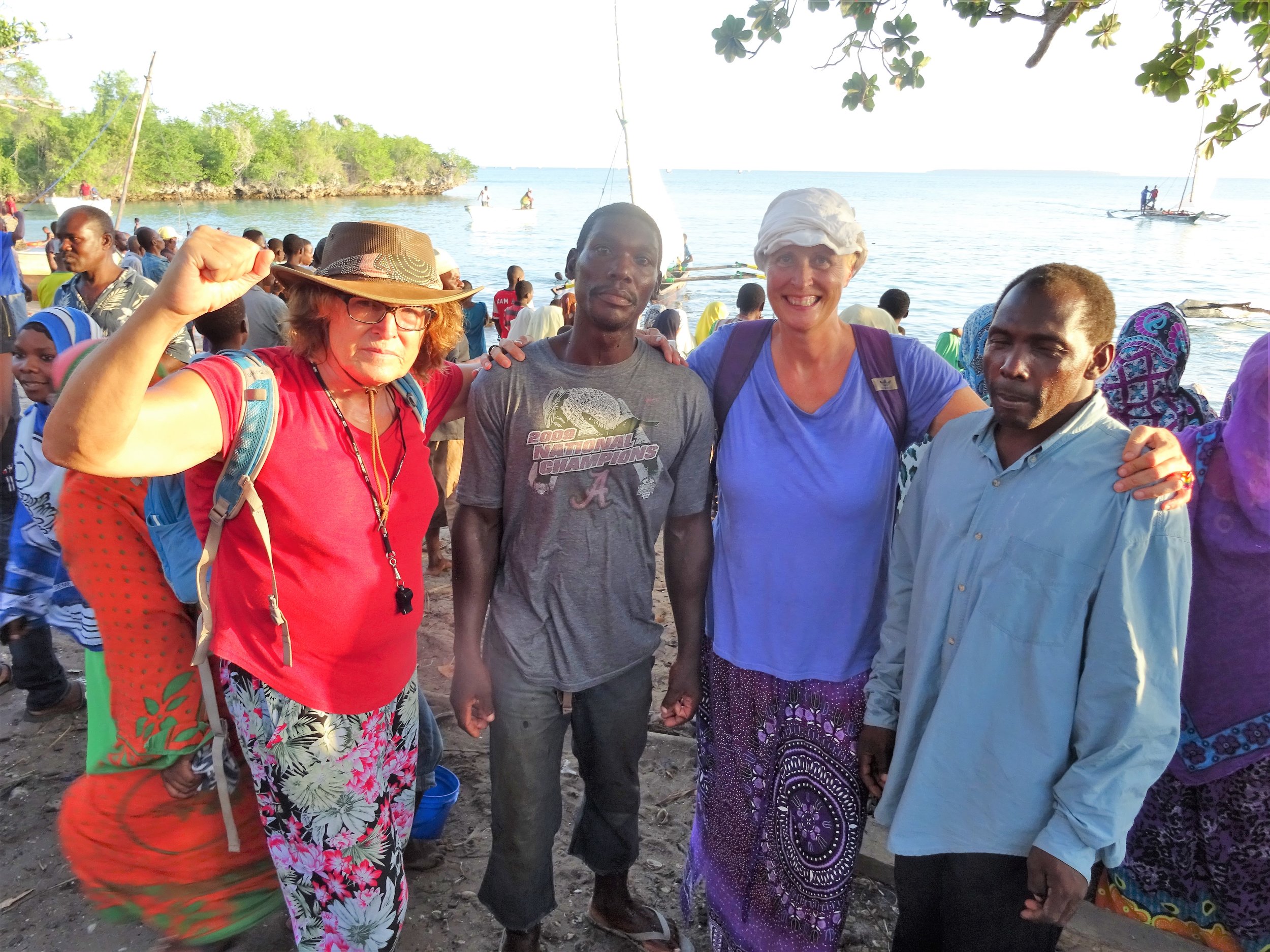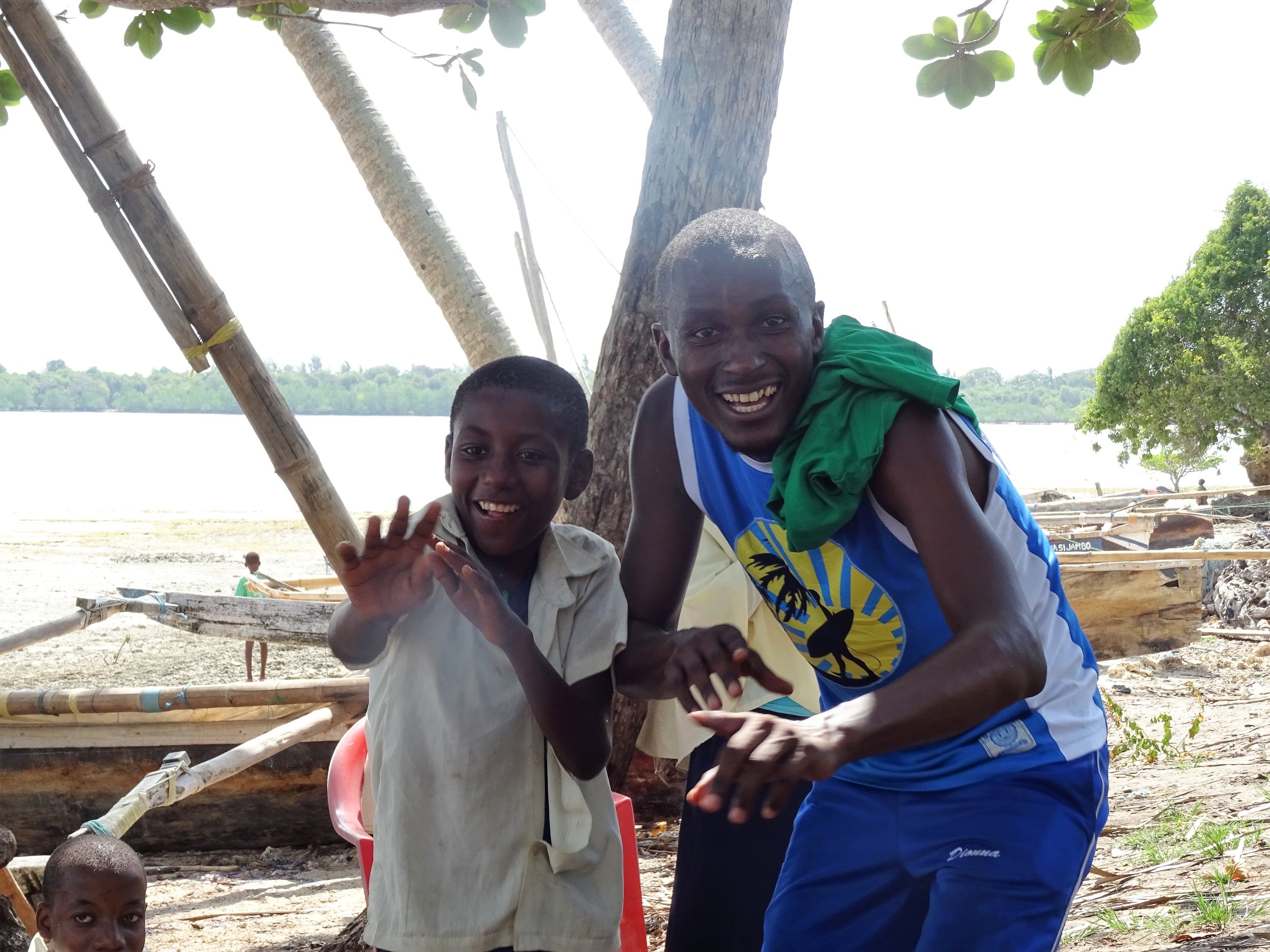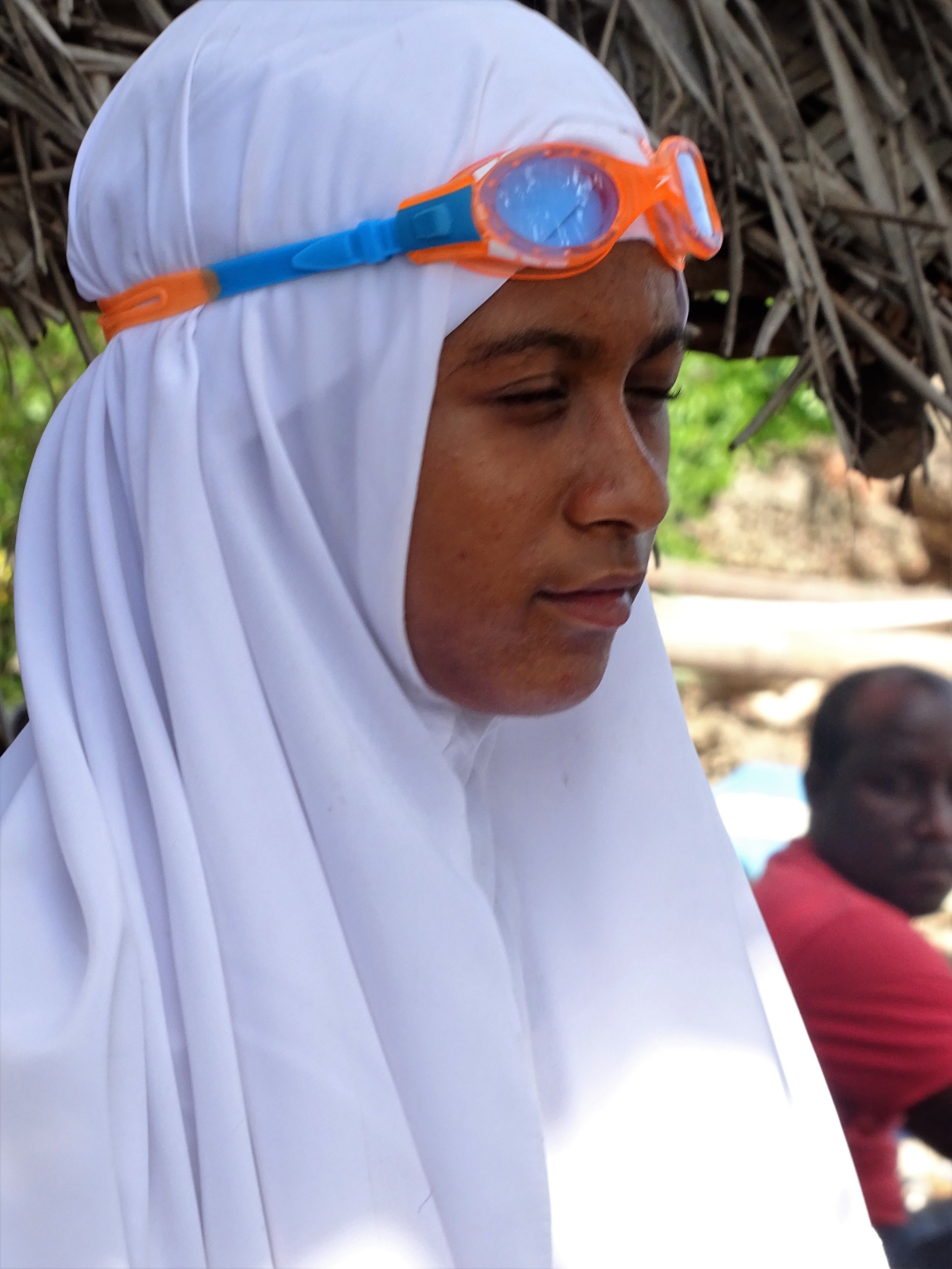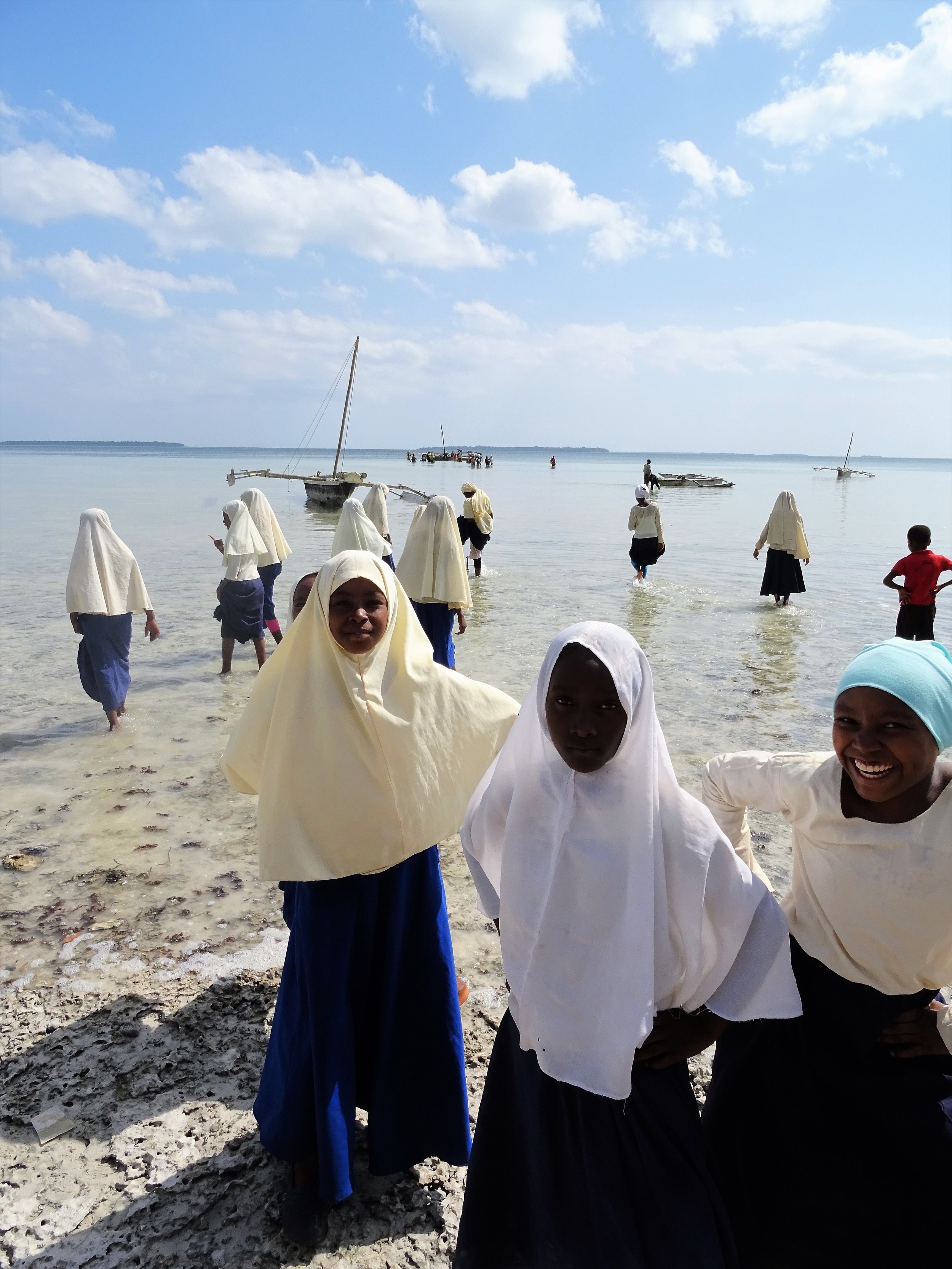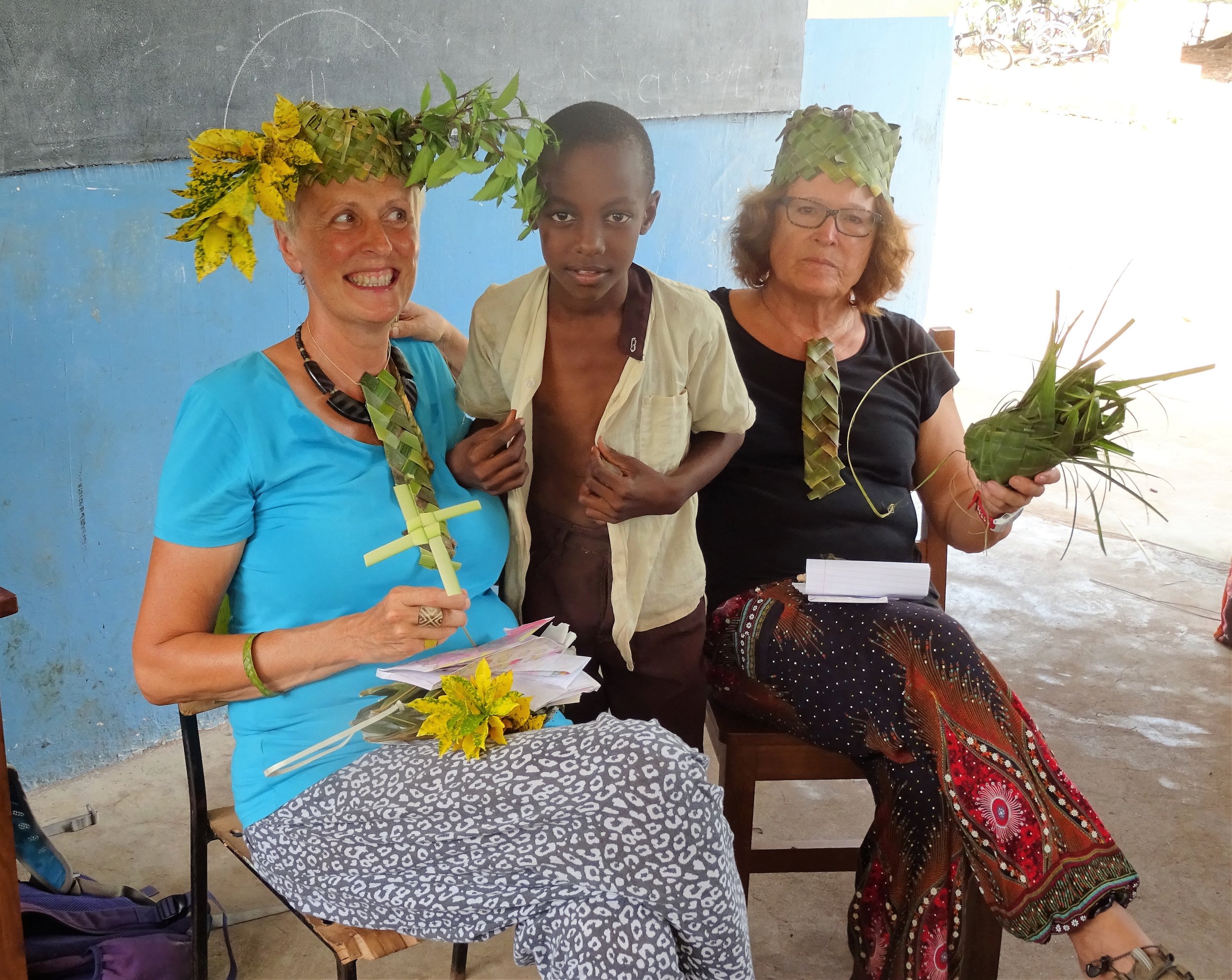Last year the village dhow race was one of the higlights of our visit to Zanzibar. So you can imagine how delighted we were when one of the Safari English Club students (who is a fisherman) asked us if we’d like to attend another race. This would be in our honour! We offered to pay the prize money and it was agreed thatWednesday’s tide would be favourable for a 3pm start. School finishes at 1pm and we’d have time for a final meeting with the teachers, community leader and the school governor before the race. Meanwhile the students could have lunch and walk to the beach.
The event snowballed and 18 boats from Unguja Ukuu and surrounding vilages took part. The sailors decided that instead of awarding first, second and third prizes, the prize money would be divided equally between all the boat crews. This seemed an excellent idea. Arriving at the beach, we were greeted by a very loud sound system playing some energetic dance music. Gasica and Sadiq entertained the students with some cool moves. A lady passing by with firewood on her head stopped for a groove. Then the white ladies took a turn on the dance floor. Caroline’s students took it in turn to dance with her. The boys executed amazing somersaults. The girls posed in their burkinis and the rest of the village turned up to party. Caroline blew the starter’s whistle and the Dhows sailed so far that they were nearly out of sight. More people arrived and the beach was full! After an hour or so the Dhows raced back – the winner was escorted onto the beach by motor boats. We presented soft drinks to the first, second and third boats and yet more photographs were taken!
The Dhow Race is an amazing experience. We don’t often come across music and dancing in Zanzibar. Public music and dancing in the village seems to be reserved for weddings and other special events which is sad as the children love to dance. Daily life is pretty hard and pleasures are few and far between. So when there’s fun to be had, it’s grasped with both hands. And we’re so happy to be welcomed as part of any festivities.
We had two wrap up meetings with the teachers. They are so polite and took time to say how much they appreciated every improvement that we’ve been able to secure at the school with the support of the Rotary Clubs in Brighton and Stone Town. The computer room has seen massive improvements and now has a tiled floor, 7 working laptops and the Kio Kits.
There are English/Swahili dictionaries aplenty. Everyone is excited about the debate team travelling to Dar. The girls who won scholarships to boarding school are a major motivation to the younger students. Gasica is keen to run a session with the teachers to encourage them to reflect on how they could improve their teaching practice to achieve more success with more students. He wants to brainstorm with the teachers to agree how best to support the students who have the potential to pass their Standard VI exams. The village leader exhorts the teachers to “work harder” but it’s really a question of “working smarter” and encouraging the teachers to try new approaches to teaching. There’s some hope with the new science teacher, who speaks good English and is motivated to teach creatively. The trainee teacher who we’ve got to know over the last few weeks has some innovative ideas. But sadly lessons consists of writing copiously on the blackboard and students copying down notes without understanding what they mean. We are setting up a structured “Standard VI” Life/study skills course which will help students prepare for their exams and give them a more equal footing with the students in Stone Town who have access to more opportunities.
The final session with all the students was incredibly moving. Many of them had written letters for us to read on the plane saying how much Safari English Club means to them. The letters are beautifully illustrated and many of them are folded into even more decorative envelopes. Lukman, who is the head boy and who has been at our classes since November 2015, included two photographs of himself – one that I’d taken of him last year, printed out on poor quality paper in black and white (the colour ink had run out) and one of him playing football. They were clearly amongst his most treasured possessions and by giving back the photo he had from last year he was making a point about how important Safari English Club is to him and how he’d treasured the photograph of him. Now we’re back home we can reflect on our second visit. When we arrived in Zanzibar we saw amazing progress. The students’ English language skills have improved immensely – the beginners are now intermediate and the intermediates are advanced! Thanks to great teaching by Gasica, Chloe, Sadiq and Mohammed. The more advanced students relish the fact that they can now talk communicate their hopes and frustrations to us and the younger students are brimming with confidence and enthusiasm.
Personal highlights of this visit to Zanzibar
ANN: I loved running lessons that were inspired by classes I observed in the UK. The Great Catapult experiment and the Tinga Tinga Art Class were just fantastic. It marked a big shift from last year, when I thought we needed to “Teach English as a Foreign Language” now I think the children also need the opportunity to be creative and to develop analytical skills. “Fun Mondays” were a highlight when students could watch Disney films or join me for Art and Craft sessions. The students learn so much English when they are “doing” and they don’t realise they are “learning” too! The arrival of the dictionaries was another highlight and it was great to see the younger children taking responsibility for their own learning and making their own mini dictionaries.
CAROLINE: I particularly enjoyed working with the advanced group, most of whom were with us last year. Teaching ‘work readiness’ which covered various skills relevant to the work place as well as a good smattering of English language was stimulating. My favourite activity was the teamwork game that Gasica had learned on his management course. Students had a great time and were very competitive. The prize of 1000 TSH to the winners was well appreciated. Mock interviews with guest interviewers gave valuable experience to students as well as exposing them to new faces from the outside world. Teaching the basic computing course where students got to grips with Microsoft Word and PowerPoint proved to be exciting as well. Most of the students managed to type their CVs, written in the course of ‘work readiness’ into the computer. A very satisfying result when you consider most of them had never used a keyboard before. I was delighted to see the donated laptops put to good use. English language training highlights included students reading aloud using material from the Kio Kits (loved by the students) and having their voices recorded and played back so they could hear how they sounded. Exciting for all of us. The screening of ‘Bend It Like Beckham’ as a highlight and it was great to explore the subjects of culture, religion, gender, generation and personal ambition. Much animated discussion in English ensued.
